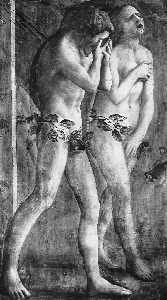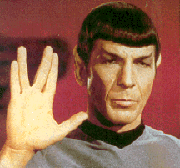
It seems more and more in my conversations with fellow Christians on theology and the Bible I find that much of the doctrines held are not extrapolated from the Bible so much as they are reflection of cultural values. No one can really escape this, there will be to varying degrees a cultural influence in our study of God's word. However, particularly around issues of predestination, God's sovereignty, and the effects of the Fall do I see gross cultural influences in many views on these issues. These are the hot button issues within evangelicalism, and frankly many Christians get more upset when someone starts talking about Limited Atonement then when someone blasphemes Christ and uses His name interchangeably with swear words.
Here I want to address the issue of Original Sin (from here on I will refer to it as OS), not just the Original Sin of Adam but the effect today on his descendents. This is weighty and realistically an entire book alone would do this issue justice (I recommend Jonathan Edwards') however, my treatment will be brief. My question which I will attempt to answer simply is this: What Did the fall do to mankind?
Objections to OSAs I have said this is a hot issue, and there are many God loving Christians who will deny the doctrine of OS. OS in doctrine is this in a nutshell: every descendant of Adam is born fallen and corrupt in need of redemption. This really irks a lot of people, more and more it seems.
(Objection 1)It isn't fair is often a cry, why should people be punished for the sin of someone else? In fact how can a loving and just God do such a thing? This seems so contrary to His nature thus this doctrine of OS really is not true. This seems to be the backbone of the objections and is woven throughout the following.
(Objection 2)Another objection raised (this was brought up in a discussion of this very issue at the Mass Theology blog) is that sin/guilt by its very nature is not something which can be transferred. God does not put Adam's sin in a bucket and put them into the souls of his descendents. Guilt/sin by their nature are not transferable, Adam's sin and guilt stopped with Adam, his descendents are not paying for his blunder by having his sin placed upon them.
(Objection 3) The final objection I will deal with goes something like this:
1.If OS is true then that means babies are born sinful
2.If babies are born sinfull that means babies that die will go to hell.
3. God simply would not do that (This leans upon the fairness of objection 1)
4. /:. Therefore babies are not born sinful.
Objections Answered:
(Objection 1) This really is the undercurrent throughout all the objections to OS, it simply isn't fair and a just God would not do this. Well this assertion ultimately commits the fallacy of begging the question as to what is fair for God to do. It misses the mark in that it really, if I am correct, imposes a human notion of justice upon God and puts God in "time out" if He acts out of this perceived notion of justice we have (thus my cultural influence preamble). He who believes in the orthodox doctrine of OS says "the Bible teaches....(proof text)" yet the denier of OS simply says "No, that simply is out of step with the justice of God." But that is to beg the very question. If the Bible teaches that the sin of Adam effects all of his progeny and there was a curse decreed BY GOD upon mankind because of Adam's sin then obviously it is NOT out of step with God's justice.
(Objection 2) Now I honestly had not heard this objection until I dialogued with Henry M Imler at Mass theology on this issue. (
Check out Mass Theology by clicking here)Now I really do respect Henry and I love their blog, however I think he strikes out bad on this. As I said I had not heard this type of objection to OS until Henry raised it, the assertion that sin/guilt are non transferable by nature therefore OS is not a tenable doctrine. As I thought about it and carried the assertion throughout you really run into many problems. The most immediate in the forefront is this: Were our sins/guilt transferred to Christ?
Logically if the one is an impossibility so is the other, if Adam's sin/guilt were not transferred to us because sin/guilt are by nature not transferable, then equally nor can our sins/guilt have been transferred to Christ because sin/guilt by nature is not transferable. This is just if we assume Henry's position. Now I have not heard anyone say this stuff but I have read it, it comes strait from Pelagius the original popular OS denier. Pelagius saw this and saw the death of Christ not as substitutionary (in our place for our sin/guilt) but rather as an example of self sacrifice to emulate. Pelagius was consistent (a consistent heretic). When I pressed Henry he (being a genuine Christian I think) did not want to abandon the substitutionary atonement, but I say he does so inconsistently.
Furthermore, this also begs the question as to whether sin/guilt can be transferred. The above response is merely the logical outcome if we assume the assertion. Are there any texts which teach that sin/guilt are non-transferable by nature? No. On the contrary we can see particularly with the death of Christ that indeed the sin of His people was transferred to Him.
(Objection 3) What are we to make of the third objection then? Well this of course strongly appeals to sentiment and commits the fallacy of an appeal to emotion. Saying if you believe in OS then you believe that babies that die go to hell which of course arouses disdain. This argument on a presupposed Arminian view of election. (We are elected because we selected, we are elect b/c we chose Jesus) The reason why babies going to hell is the consequent of holding to OS in these people's minds is because they presuppose that conscious choice on the part of the sinner is what saves. Thus, babies, who are we will say too immature to make that conscious choice, when they die have no hope.
Well, apart from the strong sentemental appeal there is a problem here, one for the Arminian. The problem is this question: "What about people who are too mentally immature to make the choice to accept Jesus as their lord and personal savior?" The Arminian gets around it by denying OS and/or making up things like "Age of accountability" (a doctrine that says Children all reach an age when they are now accountable for their sin, children under that age all go to heaven if they die) One problem with this "Age of accountability" stuff: This simply is not found anywhere in the Bible. Arminians just make it up to deal with this problem that arises due to their view of election.
I am sorry but I don't think just making up doctrines to protect God from looking unjust is the way to do theology. When we come to the Bible we can see that the reason why children die to begin with is because of sin.
"
Therefore, just as sin came into the world through one man, and death through sin, and so death spread to all men because all sinned"--(Rom 5:12)
Here logically the reason why people die is because they are fallen sinners. If a young child dies it is because that child was a sinner, I think that's the only honest way to interpret this passage. Now I will go into texts shortly but suffice it to here to say that the only reason why people have to deal with the question of dying babies is because babies are sinful (Or OS is true).
So do I believe in hell for babies? Well, ultimately I put that in God's hands, because that is where salvation is. In my view of election salvation is not dependent upon some sort of human conscious choice, rather God sovereignly converts sinners. So in my view of election God saves babies who die and can not even say "Mom" or "Dad", because salvation is a work of God. Rather than something that occurs when we wise up and decide to apply it to ourselves.
What Did the Fall do?
(A Scriptural Defense of OS)
The main thing that really gets me when I dialogue with people who reject the doctrine of OS is their utter lack of scripture to support their assertions. They are very ready to jump on the scriptures that do teach OS and do hermuenutical gymnastics with them, but when it comes to giving a text that shows that babies are born sinless they are really speechless. The question I pose to OS deniars is simply: "
What DID the fall do then?"
Firstly, I want to address the notion that sin is something by its nature that is non-transferable. Again this assertion is made in order to rule out the notion that Adam's sin effects all of mankind, thus some assert sin to be something which in its very nature can not be transferred from one person to another. As I stated already if this is the case the question naturally arises "Were our sins then placed upon Christ?"
Also, on the flip side is righteousness something that is transferable, one would think that both righteousness and its negation sin would have the same metaphysical properties, thus if sin is non-transferable neither would righteousness be transferable. Well I will cite some passages on this very issue which should help clarify for us whether BIBLICALLY the assertion that sin by its very nature is not transferable has any merit.
"For our sake he made him to be sin who knew no sin, so that in him we might become the righteousness of God. " (2 Cor 5:21)
I think here in this passage there is a twofold problem with the above assertion for not only is Christ made sin "For our sake" but also we are made righteous "in Him". There seems to be a clear exchange here, He bears our guilt and we receive His righteousness. Are sin/righteousness non-transferable in the Apostle's mind here?
"And every priest stands daily at his service, offering repeatedly the same sacrifices, which can never take away sins. But when Christ had offered for all time a single sacrifice for sins, he sat down at the right hand of God," (Heb 10:11-12)
Here we see that the repeated sacrifices could never take away sins, put in direct contrast with the sacrifice of Christ which only needed to be done once and upon being offered He sat down for it was finished. Now the contrast appears to be between a sacrifice that can NOT take away sins and one that can and has.
"As far as the east is from the west, so far does he remove our transgressions from us." (Psa 103:12)
Is sin something transferable here? If it can be removed it would certainly seem to be the case.
"For God has done what the law, weakened by the flesh, could not do. By sending his own Son in the likeness of sinful flesh and for sin, he condemned sin in the flesh, in order that the righteous requirement of the law might be fulfilled in us, who walk not according to the flesh but according to the Spirit." (Rom 8:3-4)
"It will be counted to us who believe in him who raised from the dead Jesus our Lord, who was delivered up for our trespasses and raised for our justification." (Rom 4:24-25)
"He is the source of your life in Christ Jesus, whom God made our wisdom and our righteousness and sanctification and redemption." (1 Cor 1:30)
Again in the above three passages the basics seem clear Christ died for OUR sin and we are made right in the eyes of God on the basis of HIS righteousness given to us. Now I want to get to more pertinent passages on the OS issue so I will not continue addressing the transferability of sin here. Suffice it to say that our very salvation rests on the fact that our sins were transferable by nature.
The key passages surrounding OS:
Anyone who has done any study at all into the matter of OS will know that Romans 5 is the chapter where the doctrine of OS stands or falls. I will give a brief exegetical examination of some of the passages in Romans 5 and elsewhere in Scripture.
"
Therefore, just as sin came into the world through one man, and death through sin, and so death spread to all men because all sinned"-- (Rom 5:12)
There certainly appears to be a direct link between Adam's sin and death spreading to all men. Paul's logic seems as follows:
1) Death is consequence of sin.
2) All men die.
3) /:.Therefore all men are sinners.
Now, death (physically) only comes upon those tainted with sin. However, it is an obvious fact that infants do die physically, thus they must in some way be tainted with sin. The connector is Adam. Adam is the one who brought sin into the world, and upon sinning his nature was corrupted (Gen 3) and all of his descendents inherit his corruption.
"Yet death reigned from Adam to Moses, even over those whose sinning was not like the transgression of Adam, who was a type of the one who was to come. " (Rom 5:14)
Now here Paul is working on the basis of law, saying that even though men did not have commands from God which they were guilty of willfully breaking like Adam death reigned. So sin is something larger then what we just do, we do not just do sin. Also Paul is beginning to connect his analogy to Christ. Just like how through Adam sin entered the world and death here comes Christ the second Adam bringing something different into the world.
"But the free gift is not like the trespass. For if many died through one man's trespass, much more have the grace of God and the free gift by the grace of that one man Jesus Christ abounded for many. And the free gift is not like the result of that one man's sin.
For the judgment following one trespass brought condemnation, but the free gift following many trespasses brought justification. If, because of one man's trespass, death reigned through that one man, much more will those who receive the abundance of grace and the free gift of righteousness reign in life through the one man Jesus Christ." (Rom 5:15-17)
Here the analogy comes to its peak and its clarity. I think Romans 5:15 is probably the most crucial single verse showing our connection to Adam. " Many died through one man's trespass" people are perishing for Adam's guilt/sin. To which the natural man cries: "
That's NOT FAIR!"
Nevertheless, that is blatantly what Paul has just declared, people die through Adam's trespass. There is a connection between Adam's trespass and his progeny says Paul. If the OS deniars are right this analogy shouldn't be in the Bible. There is no connection between Adam's sin and me if they are correct. Paul says that there is a connection between me and Adam's sin.
Paul here displays 2 humanities 1)Those in Adam and 2)Those in Christ.
Humanity 1) is those who are connected to Adam simply by being a descendent of Adam through physical birth thus inheriting his nature, his fallen sinful nature. Those who have a fallen sinful nature (those in Adam) die physically and spiritually. Those with this fallen nature naturally are averse to the things of God (Rom 8:6-7) and really want nothing to do with God (At least on His terms) and prefer sin over God.
Humanity 2) is those who are connected to Christ by being one of His offspring through spiritual birth (John 3) thus they have a new nature being born again. These die physically but will live spiritually. Being born again is being given a nature that is not at enmity with God and desires God over the fleeting pleasures of sin.
I just wonder why the gospel and new birth are even necessary if you deny OS. Seriously, why wouldn't a moral code be sufficient if we have no natural inclination toward sinning? If everybody can know what is right and wrong and choose one or the other and we have no natural inclination toward one over the other why is regeneration needed at all or the gospel for that matter? You violated the law that's YOUR bad and everybody deals with God on this sort of playing field. That's what Pelagius suggested, grace in Pelagius' mind was Christ coming not as a redeemer but an example to imitate and be saved via imitation. Seems "FAIR" right?
Well here's where the
"Fair" notion by evangelical OS deniers seems hypocritical. Evangelical OS deniers want to say that it is unfair for Adam's sin to be placed upon his descendents, yet they have no qualms whatsoever to celebrate that their sins were placed on Christ!
Aside from the arrogance of man to have the gall to stand before God almighty and declare His decrees to be unfair we can see the absurdity of their charges. It isn't fair of God when Adam's is transferred to his descendents yet it is quite alright on God's behalf when Christ is the recipient of our sins. Not only is this arrogant but it is an inconsistent charge.
It would be consistent if the OS deniers rejected the evangelical faith and became like Pelagius and saw the law to be sufficient to save and Christ's work not as a sin bearer but example to imitate. Pelagius was at least a consistent heretic, not only did he deny that we are connected to Adam via OS but also he denied that our sins were imputed to Christ.
To conclude, based upon Romans 5 we really have 2 options (I don't think this is a false dilemma) there really are 2 options if we are going to be consistent logically.
 1)
1)We can deny that humanity has any connection with Adam and his sin and that we are born neutral to sin (On the basis of God being "Fair" or that sin is nontransferrable by nature), but on the same token we would need to deny an evangelical view of Christ's work as well. Christ could not have born our sins (If sin is non transferable) nor would it have been "Fair" for God to have punished Him for our sins. Either way it would simply be inconsistent with Romans 5 to deny OS but affirm substitutionary atonement.
(
**the latter "NOT FAIR!" view is actually growing in popularity particularly among Emergent authors who declare the substitutionary atonement view to be "Divine Child Abuse"
**)
2)Or we can affirm both like Paul. We are born sinners who by nature are at enmity with God, we are not neutral observers, our will is a lackey to our nature which is corrupt. We need a new nature, a righteousness and our sin to be absolved. Christ gives us these. Christ is our sin bearer, our righteousness, and He bestows grace via regeneration that men might have a new nature, one that is not at enmity with God.
In the next post on this topic I will further address precisely the effects of the fall on humanity, in this post I have mainly been defending the position that the fall did have an effect on us. I have touched on some effects already but I realize this deserves a greater treatment than I have given it here.
















